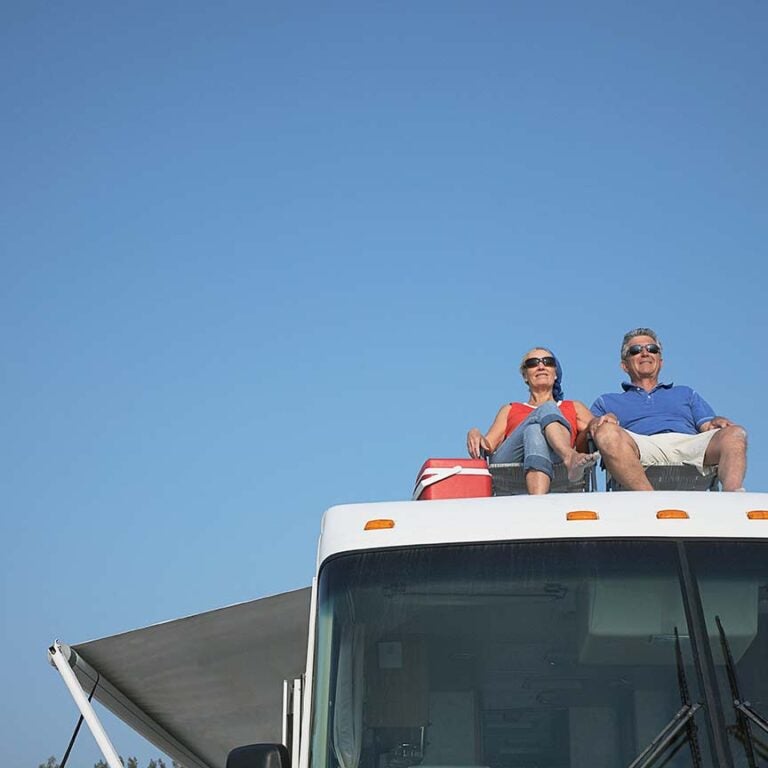Diehard RVers will tell you there’s no better way to spend your retirement than in an RV. With the freedom of the open road, life RVs offers the chance to explore the world and get to know yourself in a new way.
“You will have the best years of your life traveling in an RV,” says Gigi Stetler, CEO and founder of RV Advisor and the owner of a Florida RV dealership.
But RV life can also be frustrating and physical, so you might wonder if you’re too old for travel in your 70s. “Not at all!” say seasoned RVers. But they do caution you to be realistic about what to expect.
Here are their top five tips to help you prepare for the reality that rides shotgun with the romance of the RV lifestyle.
1. Rent Before You Buy
Across the board, experienced older RVers recommend researching RV models, then renting those options that seem like the best fit for your plans and abilities over a long weekend. (Let the Go Rving quiz help you decide.) “If you’ve never experienced the RV lifestyle, you need to rent several different types,” says Stetler. Options range from those you tow to motorhomes and self-contained camper vans.
Amy Collins, 55, who RVs full time with her husband, Tim Clark, 65, recommends trying a smaller model if you have physical limitations. “Rent smaller than you think you can handle. If this is for vacationing and you’re not going to live in it, don’t kid yourself and think you need a 40-foot vacation home. You’ll spend most of your time outside, anyway,” she says.
“Enjoying a mini-vacation in a rental will also give you a sense of what it’s like to drive eight hours a day,” adds Donna Brown, 70, who spends much of the year in an RV with her husband, Gary.
Rental sites include traditional rental companies such as Cruise America and El Monte RV, Outdoorsy and RVShare, which act like Airbnb for RV owners who want to rent out their vehicles. “There’s a whole array of different RV types, so you should be able to find the type you might be looking to buy, but costs can be unnerving,” cautions Mark Petersen, founder of Arvie, a new booking site that acts as a Travelocity for camping sites.
Still, spending the money to rent before buying will prevent an expensive mistake if you buy more vehicle than you need or can handle.
2. Take Physical Limitations Into Account
While her bad knee doesn’t keep 71-year-old Mona Prater from enjoying RV life, there’s no way around the fact that it makes it difficult to climb into the Class C motorhome (the type with an over-the-cab sleeping and storage area) she shares with her husband, Danny. “My knees were going,” she says. After struggling for a week, she bought a collapsible step stool.
RVer Michael Scarpignato, who blogs at RV Blogger with his partner Susan McDonald, cautions 70-plus retirees to be realistic about their abilities. “There are several aspects that can be physically challenging. For example, you may have to bend over to hook your RV to the water, sewer, and electrical connections. And you will need to bend and twist to lift things like your chairs, grill, charcoal, firewood, and more to fully enjoy the camping experience,” he says.
You’ll also need strength to manage the vehicle’s jerking and pulling in motion, which Brown describes as a “moving earthquake” on the highway. That’s even harder if you’re towing a vehicle, adds Collins, who notes that many older RVers opt instead to pack electric bikes for forays to local destinations after they settle into a campsite. “Towing a vehicle behind us requires a lot of physical labor I wasn’t prepared for,” she says.
3. Refill Prescriptions Before Leaving and Plan for Medical Emergencies
Taking medication? Be sure to pack enough for your trip, especially if it’s a controlled substance. Because of state laws regarding filling those prescriptions, Brown and her husband once had to travel south from the Adirondack foothills in the northern part of New York State to Pennsylvania to refill her husband’s prescription for a serious medical condition.
Collins recommends joining Escapees RV Club, which offers a range of services that include Escapees CARE Centers that provide professional assistance at affordable prices for members whose travels are impacted because of age or temporarily interrupted because of health problems.
4. Expect Problems (Because You Will Have Them)
While the Browns had done enough research before buying their RV to know that they could expect downs along with the ups, they didn’t think they’d have problems at their first campground. Just 250 miles from the home they had just sold, the Browns’ vehicle interior was flooded during torrential rain. They had to return to the dealership, where they quickly discovered what was and wasn’t covered by their extended warranty.
Collins and Clark, whose first RV was a toy hauler they towed, only got 32 miles into their new mobile lifestyle when their truck’s new transmission exploded. “We spent two weeks at a campground while it got fixed,” Collins says.
5. Enjoy Having Everything the Way You Like It
One of the beauties of RV travel, says Petersen, is that you can travel with your favorites, whether it’s the coffee maker from home or the RV mattress you bought when you realized that the one that came with the vehicle wouldn’t cut it.
“The way you RV can be an extension of your personality in some ways. My wife and I are empty nesters now, and we like to travel in our RV rather than staying in hotels because everything is ours. It’s your own condo on wheels. You can take your life with you,” he says.
As long as you’re realistic about what to expect and what you can handle, 70 very well might not be too old to enjoy vacationing in an RV.
Seniority is published by Finance of America Reverse LLC. The views expressed in this publication are those of the author alone and do not necessarily reflect the views and opinions of Finance of America Companies. This article is intended for general informational and educational purposes only and should not be construed as financial or tax advice. For more information about whether a reverse mortgage may be right for you, you should consult an independent financial advisor. For tax advice, please consult a tax professional.




